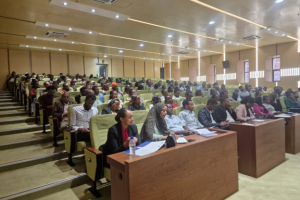BY MENGISTEAB TESHOME
We are living in challenging and uncertain times. Reports coming are confirming that, there were already over one million confirmed cases and more than 2.4 million deaths of the coronavirus (COVID-19) according to the World Health Organization, (WHO).
Though, every country across the globe is struggling to contain the spread of the COVID-19 virus and restrain its health, societal, and economic consequences, it seems that the pandemic is revisiting countries in the second wave killing many.
The pandemic is creating negative impacts on communities and countries’ economy, because many nations’ development and businesses are getting stuck, several workplaces and human development facilities are not working in full potential.
Though communities and governments are doing their best level of engagements to curb the pandemic, the efforts are not bearing fruits for a number of reasons.
The situation is not different in Ethiopia. The consequence of the pandemic though is not as harsh as other countries; it is influencing the lives of its citizens negatively and impacting the economy of the country hugely. Sadly, presently, the number of confirmed new cases, deaths of the coronavirus (COVID-19) and the amount of patients in Intensive Unit Care (ICU) beds is increasing alarmingly, as reports indicate.
This piece writer had visited some of primary and secondary schools in the capital, Addis Ababa, to learn how school communities are applying the rules of wearing facemasks to prevent the spread of the virus.
Mihretu Mengiste an 8 grader student at Kilinto Elementary School said that wearing facemasks is useful to reduce the spread of the pandemic as covering mouth and nose reduce droplets from coughs and sneezes. “If we could not take the prerequisite care and join our hands, the ending would be somewhat catastrophic. We have to follow and exercise the guidelines of WHO and the Health Minister as it should.”
With regarding to responding the ‘No mask no services’ initiative campaign, Mihretu noted that in his school, they are trying their level of best in wearing mask in the right way.
The daily reports and ads are telling how the death toll is growing as well the number of cases is surging across the nation. Initiatives like ‘No mask no services’ are helpful to make communities more alert with the guidelines and take care of themselves.
Though community engagement is considered as a fundamental component and is important to ensure contextually appropriate interventions, the ‘No mask no service’ initiative is not translated with its full essence to the ground.
The Health Minister, Dr. Lia Tadesse of late shared media that senior leadership should be modeled in an effort to combat the spread of the virus because we are witnessing senior leaderships are spotted unmasked in human gathering.
“No Mask, No Service” national mask wearing campaign performance should be well evaluated among all stakeholders.
At the same time the Addis Ababa City Administration has launched a six-month long campaign to enhance the prevention measures of COVID-19 pandemic. The effort is commendable because over fifty percent of case reports nationwide come from Addis Ababa.
Dejach Belay Zeleke Secondary School Principal Daniel Amente for his part noted that students are wearing facemasks in the premises of schools; but not outside, because of negligence and recklessness. Though almost all know the benefit of facemask wearing, they do not implement it accordingly. So, it is high time to create more awareness creation among the communities.
“In my view, widely observed negligence among the people has been the key challenges in the effort to prevent the spread of the pandemic, so it is very important to revisit the performances in all pertinent stakeholders, he added.
Elevating communities’ prudent actions, that have been dwindling after the state of emergency was lifted, and strengthening the performance should be one of the core objectives of the campaign, he noted.
According to Addis Ababa City Health Bureau Head, Dr. Yohannes Chala, the magnitude residents’ prudence to tackle the pandemic has been declining to 54 percent from 75 percent which was observed during the state of emergency.
Finally, careful action should be strengthened among communities through organized awareness creation activities because community led initiatives are stronger in addressing the negligence among the communities to combat the pandemic. It is clear that the combination of high population density, poor housing, limited access to water and sanitation, overstretched or inaccessible health services and widespread poverty, increase the risk and impact of a COVID-19 pandemic in these settings.
To let these communities practice the initiative, the Ministry of Health and development partners in the health sector should come together in an effort to make them active in the campaign.
In some instances, this piece writer has witnessed that many school communities are not wearing masks yet they are not asked why? In my view, all stakeholders should come together to evaluate the responses made by communities and various service delivery institutions in translating the initiative to the ground and make sure that the rules are implemented properly and in more organized manner.
Hotels and transport services are trying to enforce communities but the law enforcement bodies are not well partaking in inspecting pedestrians who violate the rule and regulation.
In fact in earlier times, communities had made responses swiftly. However, the care and commitment that had been seen once could not sustain at the desired level. To alleviate this challenge, the leadership at various ranks should discharge responsibilities accordingly.
The Ethiopian Herald February 18/2021




